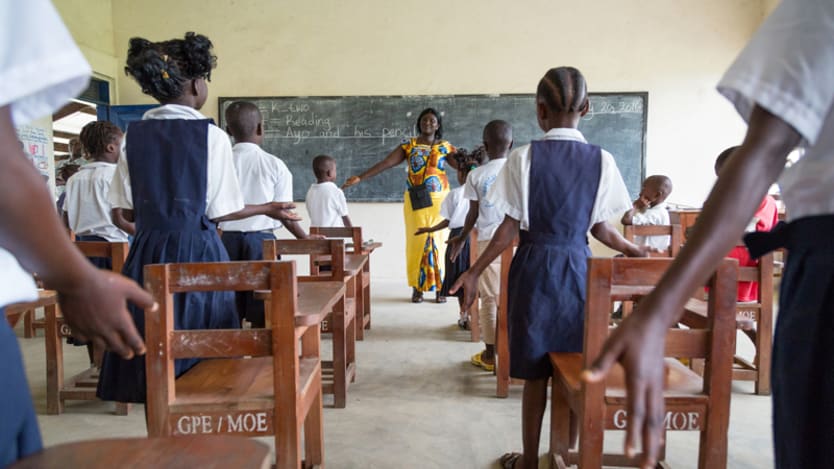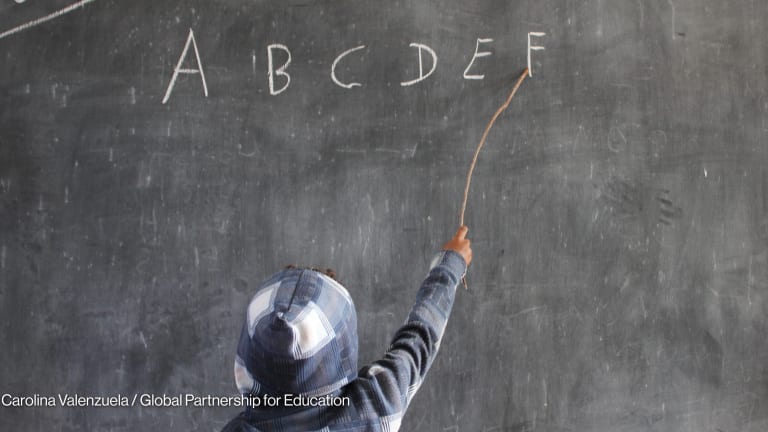Opinion: Liberia’s battle to educate our next generation

On Tuesday, Liberians will go to the polls to elect our next leader. When the new president is inaugurated in January, it will be the first peaceful transfer of power in my country for more than 70 years. This will be a major milestone in our democracy, and a moment all Liberians can look forward to with pride.
Liberia’s past has been a troubled one. Years of conflict took more than 200,000 lives. Ebola took thousands more. The impact of both crises left our infrastructure decimated, our economy shattered, and our education system in tatters.
Rather than looking back, this election has everyone thinking about Liberia’s future and what kind of country we want to build for our children. That’s the question I asked myself when I was appointed minister of education by President Ellen Johnson Sirleaf in 2015, and I believe our approach can serve as a model for other countries recovering from conflict and crisis.
Decades of slow recovery was not an option we considered. Instead we looked for opportunities to rapidly accelerate progress. We launched a reform program to transform our education system and dramatically improve learning outcomes. These reforms were developed based on an in-depth analysis of our education sector, with assistance from the Global Partnership for Education and the World Bank.
Our efforts have been all encompassing. We went county to county, vetting every single teacher and assessing their abilities. We removed 1900 “ghost workers” from the payroll — who were deceased, non-existent, or simply not showing up. This led to $2.5 million in annual savings that can be reinvested in education — either in training our existing teachers or hiring energetic new, qualified graduates.
Another of the reforms we launched — Partnership Schools for Liberia (PSL) — has attracted international attention. Through PSL, the government has partnered with eight education providers to manage a small group of public schools. The aim of the program, now in its second year, is to test new ways to deliver quality education to our children.
After just one year, an independent evaluation has found evidence of results that could be truly transformational for the future of Liberia. Students in PSL schools are learning 60 percent more on average than their peers in other public schools. Teachers are 20 percent more likely to be in school and are more likely to be engaged in instruction during class time. The program is helping us identify new approaches to be implemented across the entire school system, not just in the schools in the PSL program.
Critics have argued that PSL is too expensive to maintain. The fact is that, at $50 per pupil, Liberia’s education spending is among the lowest in the world. The government has set a target of raising education spending to $100 per pupil by 2020, across all our public schools, and PSL was designed in part to test what this additional spending could achieve, when combined with good management. So, on top of the amount the government spends at all public schools, PSL schools have been provided with a $50 per pupil stipend from a pool of philanthropic funds. Some providers have chosen to raise and spend more, at no cost to the government. Ultimately we must be able to sustain PSL within our own means — and we will do so. For now, I would find it impossible to look our children in the eye and tell them we turned down additional funding to provide them with a chair to sit on or a pencil to write with. This is something our ideological critics just don’t seem to understand.
We have also been criticized for introducing class size limits at PSL schools. While I understand the concern, I would invite anyone who argues against class size limits to visit one of our schools that doesn’t have them. You will see 100 students cramped into a space designed for half that many, crouched on the floor or standing at the back: struggling to see or hear the teacher. How can you learn in an environment like that? Addressing this will mean building more classrooms and recruiting more teachers as well as limiting class sizes. We are working to do all this across the whole education system.
Finally, critics have focused on the small number of teachers who have been removed from schools. Following more than a decade of civil war and the Ebola epidemic, Liberia lost thousands of qualified teachers. To help fill that void, dedicated and committed volunteers stepped up, and we are hugely grateful for their service. However, many of the teachers who entered the education system in this way did not undergo assessment and training. Wherever possible, PSL providers and the ministry have given teachers on-the-job training and support to help them build their skills. However, in exceptional cases where teachers are illiterate, innumerate, or chronically absent, we have had no choice but to help them find employment elsewhere. This is an unfortunate but essential part of our effort to improve the quality of teaching across all public schools.
Liberia isn’t alone in the challenges that we face. There are too many post-conflict countries around the world that are dealing with similar issues. If they look at our experience and see that, despite the positive results, many only want to criticize, will it stop them from taking bold steps to help the next generation in their country have a better life? I truly hope not.
Because it is clear that our reforms are paying off and helping us achieve our goal: building a better future for all our children. That’s something worth fighting for.
Join the Devex community and access more in-depth analysis, breaking news and business advice — and a host of other services — on international development, humanitarian aid and global health.
Search for articles
Most Read
- 1
- 2
- 3
- 4
- 5








